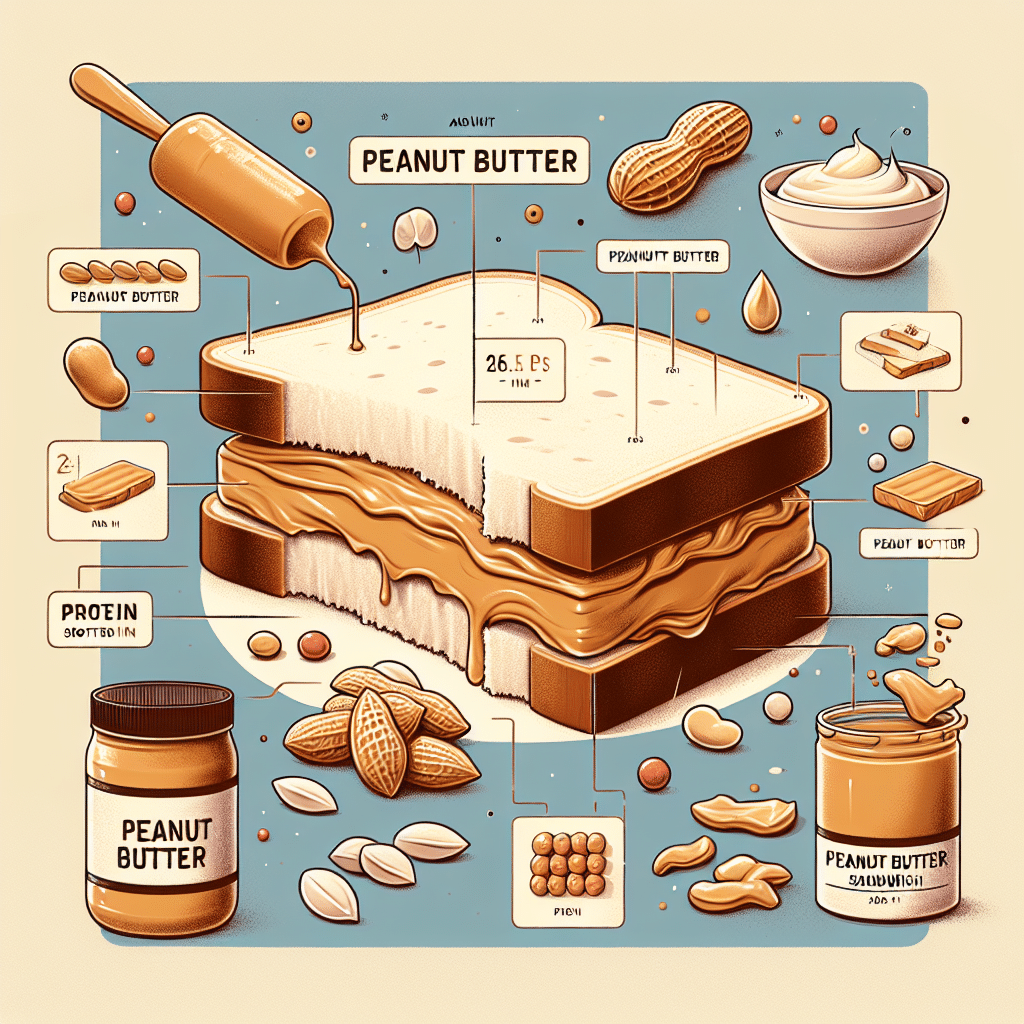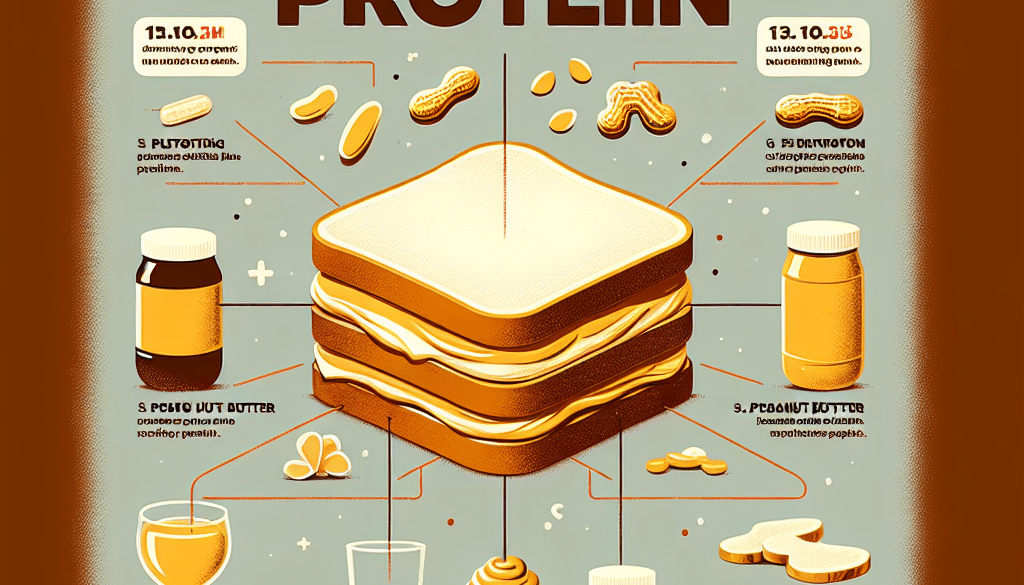How Much Protein Does a Peanut Butter Sandwich Have: Spreading the Protein
-
Table of Contents
- Protein Content in Peanut Butter Sandwiches: A Nutritional Breakdown
- Understanding Protein in Our Diet
- The Nutritional Profile of a Peanut Butter Sandwich
- Factors Influencing Protein Content
- Maximizing Protein in Your Peanut Butter Sandwich
- Health Benefits Beyond Protein
- Considerations and Potential Downsides
- Conclusion: Spreading the Protein Wisely
- Discover ETprotein’s High-Quality Protein Products
Protein Content in Peanut Butter Sandwiches: A Nutritional Breakdown

When it comes to quick, convenient, and tasty sources of protein, few foods are as beloved and widespread as the classic peanut butter sandwich. This staple of lunchboxes and quick snacks has been a favorite for generations, but how much protein does it really offer? In this article, we’ll spread the facts on the protein content of peanut butter sandwiches and explore the nutritional benefits they can provide.
Understanding Protein in Our Diet
Protein is an essential macronutrient that plays a critical role in building and repairing tissues, making enzymes and hormones, and supporting immune function. The Recommended Dietary Allowance (RDA) for protein is 46 grams per day for women and 56 grams for men, although individual needs may vary based on factors like age, sex, weight, and activity level.
The Nutritional Profile of a Peanut Butter Sandwich
A typical peanut butter sandwich consists of two slices of bread and two tablespoons of peanut butter. To accurately assess the protein content, we must look at each component separately.
- Bread: The type of bread used can significantly affect the protein content. Whole wheat bread, for example, generally contains about 4 grams of protein per slice, while white bread might offer only 2 grams per slice.
- Peanut Butter: Peanut butter is a rich source of protein, with approximately 8 grams of protein per two-tablespoon serving. However, protein content can vary slightly between brands and types (e.g., smooth, crunchy, natural).
Combining these figures, a peanut butter sandwich made with whole wheat bread can contain around 16 grams of protein, while one made with white bread might provide closer to 12 grams.
Factors Influencing Protein Content
Several factors can influence the protein content of your peanut butter sandwich:
- Choice of Bread: Opting for whole grain or sprouted grain bread can increase the protein content compared to white or refined bread.
- Amount of Peanut Butter: Using more than the standard two tablespoons of peanut butter will naturally boost the protein content.
- Additional Ingredients: Adding ingredients like seeds, nuts, or sliced meats can further enhance the protein in your sandwich.
Maximizing Protein in Your Peanut Butter Sandwich
To make your peanut butter sandwich a more potent source of protein, consider the following tips:
- Choose a high-protein bread such as Ezekiel or other sprouted grain options.
- Select natural peanut butter with no added sugars or oils, as these can detract from the overall nutritional value.
- Consider adding a slice of lean turkey or chicken breast for an extra protein punch.
- Include seeds like chia, flax, or hemp to increase both protein and omega-3 fatty acids.
Health Benefits Beyond Protein
While protein is a key nutrient in peanut butter sandwiches, they also offer other health benefits:
- Healthy Fats: Peanut butter contains monounsaturated and polyunsaturated fats, which are beneficial for heart health.
- Fiber: Whole grain bread is a good source of dietary fiber, which aids in digestion and can help maintain a healthy weight.
- Vitamins and Minerals: Peanut butter sandwiches provide essential nutrients like vitamin E, magnesium, and potassium.
Considerations and Potential Downsides
Despite their benefits, there are some considerations to keep in mind when consuming peanut butter sandwiches:
- Calorie Density: Peanut butter is high in calories, so portion control is important, especially for those watching their weight.
- Allergies: Peanuts are a common allergen, and those with peanut allergies should avoid peanut butter.
- Added Sugars: Some peanut butter brands add sugar, so it’s best to choose natural or unsweetened varieties.
Conclusion: Spreading the Protein Wisely
In conclusion, a peanut butter sandwich can be a substantial source of protein, especially when made with whole grain bread and natural peanut butter. By understanding the factors that influence protein content and making smart choices, you can enjoy this classic meal as part of a balanced diet. Remember to consider the overall nutritional profile and your individual dietary needs to make the most of your peanut butter sandwich.
Discover ETprotein’s High-Quality Protein Products
If you’re looking to supplement your diet with additional protein, consider exploring ETprotein’s range of organic and plant-based protein products. Their selection includes organic rice protein, clear rice protein, pea protein, and more, all designed to meet various dietary requirements and preferences. With ETprotein’s commitment to non-GMO, allergen-free ingredients, you can trust that you’re getting the best quality for your nutritional needs.
About ETprotein:
ETprotein, a reputable protein Chinese factory manufacturer and supplier, is renowned for producing, stocking, exporting, and delivering the highest quality organic bulk vegan protein and plant proteins. They include Organic rice protein, clear rice protein, pea protein, clear pea protein, pumpkin seed protein, sunflower seed protein, mung bean protein, peanut protein etc. Their offerings, characterized by a neutral taste, non-GMO, allergen-free attributes, cater to a diverse range of industries. They serve nutraceutical, pharmaceutical, cosmeceutical, veterinary, as well as food and beverage finished product distributors, traders, and manufacturers across Europe, USA, Canada, Australia, Thailand, Japan, Korea, Brazil, and Chile, among others.
ETprotein specialization includes exporting and delivering tailor-made protein powder and finished nutritional supplements. Their extensive product range covers sectors like Food and Beverage, Sports Nutrition, Weight Management, Dietary Supplements, Health and Wellness Products, and Infant Formula, ensuring comprehensive solutions to meet all your protein needs.
As a trusted company by leading global food and beverage brands and Fortune 500 companies, ETprotein reinforces China’s reputation in the global arena. For more information or to sample their products, please contact them and email sales(at)ETprotein.com today.












